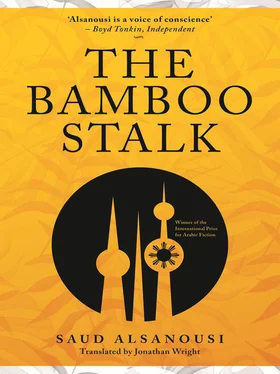‘Listen,’ said Maria. I shut my eyes and pricked up my ears. She went on angrily: ‘I don’t know anything about her.’
‘Maria, please.’
She didn’t say anything for a while. I didn’t ask her again. I waited for her to calm down. Then she continued: ‘She changed a lot before she disappeared. She started to hate being with me.’
‘And then what?’ I asked her politely, and waited for her answer.
‘On the last night we were together, we’d been drinking, she said she needed someone who understood her and made her feel fulfilled, that she needed a man. I woke up in the morning and she was gone,’ she said.
She called off without saying any more. I put my mobile phone aside. I stared at the laptop but I couldn’t bring myself to check whether there was a message. I was like someone who shows clear signs of being ill, such as vomiting, high temperature and spots on their skin, but who refuses to go to the doctor for fear of hearing what they don’t want to hear.
I was sick at the thought that Merla had disappeared and all the symptoms of my disease pointed to the fact that she. .
10
One weekend night I was on my way home in my work uniform after a tiring day. I stank of food for which I no longer had any appetite. My stomach turned whenever I saw an advert for the meals I prepared robotically every day. I would go back to the kitchen in my flat dying of hunger and enjoy some food that I had made with my own hands, as if the stuff I prepared all day long wasn’t really food.
In the lobby of my building that night I pressed the lift button and leaned back against the wall, waiting for it to arrive. My eyes were glued to the panel that showed which floor the lift was on. It started at 8, then 7, 5, 3, 2 and finally G. The lift stopped. Other things stopped too — my brain, my heartbeat and time itself.
It wasn’t just the lift door that opened. It was a door to Kuwait that opened, a door I had glimpsed in the Philippines when I was impatient to visit my father’s country. Suddenly it was wide open.
Through the door came a young man who didn’t even notice I was there. He probably wasn’t interested in the Asian standing in front of him in the uniform of a restaurant worker. My back was still against the wall. I was so surprised I couldn’t speak. The man ambled towards the main door.
‘Hi,’ I shouted after him, ‘a moment, please.’
The man wheeled round and looked blankly into my face. He looked around him, then pointed a finger at his own chest and asked, ‘Me?’
I nodded. ‘ Shloonak ?’ I asked him in delight.
The man grimaced. I went up to him and put out my hand to shake his. He raised his hand out of the way and recoiled in disgust. ‘Keep your distance. Don’t touch me. I’m not the type you’re looking for,’ he said.
I was taken aback. I was about to say, ‘Yes, you are one of them. Where are the others?’ but I was worried this might confirm his misunderstanding, especially as he didn’t seem to be completely sober. He turned away to leave, muttering angrily.
‘I’m Isa!’ I shouted after him. He walked on, paying no attention. ‘Hey!’ I said. ‘Boracay Island! Red Horse beer!’
The man suddenly stopped in his tracks and turned towards me. He pointed at me and took a close look at my face. ‘You?’ he said. I smiled in confirmation. He came back into the lobby. ‘The Kuwaiti Made in Philippines?’
‘Yes, yes,’ I replied with a laugh.
Still pointing at me, he continued, ‘You’re the one who. .’ He leaned forward and shook his shoulders as if dancing.
‘Yes, yes,’ I said, nodding again. We both burst out laughing. The doorman, disturbed by the noise we were making by the lift, came out of his room.
‘You’re the one who. .’ the man said again. He put his hand on his head and bent his legs. He jumped up and as soon as his feet landed back on the ground, he turned and walked slowly, shaking his shoulders.
I couldn’t control myself. It was the dance I loved and that I’d danced with him two years ago in the Philippines. I went up to him and stood face to face. I began copying the way he was dancing. ‘Yes, yes. It’s me,’ I said. I stretched my arms out and he did the same. We began to pull on that invisible rope. Both of us were shaking, partly from the dance itself and partly because we were laughing so much.
The doorman didn’t come beyond the door to his room. He shook his head disapprovingly, clapped his hands and disappeared back into his room without saying a word.
Could I say it was the first time I’d had a proper laugh in Kuwait?
Yes, I could.
We exchanged phone numbers, Mishaal and I. Mishaal, who I called Michel because I couldn’t pronounce the difficult ‘ain’ sound in the middle of his name, was one of the crazy young Kuwaitis I had met in Boracay when I was working there. He was the guy with the glass of beer who danced with me on the beach. By strange coincidence I danced with him again in Kuwait, close to two years after we first met. Some coincidences are wonderful: they suddenly appear like a bend in a road that leads to the unknown. Mishaal’s reappearance in this manner gave me an opportunity to get close to my Kuwaitiness, which I had hardly been aware of.
Mishaal usually spent the weekend in his flat on the eighth floor of the building I lived in, doing what he couldn’t do anywhere else, as he put it. When he noticed I was intrigued, he showed me what he meant. He put out his hands, took hold of an imaginary glass in one hand and began to pour air into it from an imaginary bottle in his other hand. Then he pretended to drink. ‘You all claim that alcohol’s forbidden,’ I said with a laugh, ‘but it’s as plentiful as water.’
He nodded and said, ‘As plentiful as water, and as expensive as gold.’
I asked him about the rest of the gang. He said they were well. Although they lived in different parts of Kuwait they got together almost every day in the diwaniya of one of them in an area nearby. ‘Why don’t you meet here on the eighth floor?’ I asked, pointing upstairs.
‘As you know,’ he replied, ‘no one else in the gang drinks alcohol. Besides, places like this arouse suspicion.’
I thought that remark was odd. ‘But I live here!’ I said. ‘Do I arouse suspicion?’
He patted me on the shoulder and laughed. ‘Don’t worry,’ he said. ‘It only arouses suspicion in the case of Kuwaitis.’ I let it pass. Perhaps he didn’t mean it, or he’d forgotten I was Kuwaiti.
‘Does that mean they’re frightened of the police?’ I asked.
‘The police don’t frighten anyone,’ he said. ‘They’re frightened of what people will say.’ He held out his hand as if holding an apple. ‘Kuwait’s a small place. Everyone knows almost everyone else,’ he said.
* * *
I took off my work clothes and threw myself down on the sofa in the living room, elated by the encounter, which had added a touch of happiness to my evening. But too much happiness is rather like sadness. It’s irritating if you can’t share it with someone. I called Ibrahim. My words couldn’t keep up with my feelings: ‘Ibrahim! Would you believe it? Two years ago. By chance. Kuwaitis. Young guys. Boracay. Crazy people. We’re going to meet again. My friends. Kuwaitis. Kuwaitis. Kuwaitis.’
After a long silence in response to the news I brought, Ibrahim said, ‘All this excitement because you met some drunk guy?’
I tried to explain: ‘In fact he wasn’t completely drunk.’
‘Brother,’ Ibrahim broke in, ‘choose your friends very carefully. You don’t need people of that kind.’ I didn’t respond. ‘I know you’re looking for Kuwaiti friends, brother Isa,’ Ibrahim continued. ‘Join our group and not only will you have lots of friends, but you’ll have Kuwaiti brothers, as you wanted, to guide you to the right path and to give you assistance.’ I thanked him and the conversation ended. If Ibrahim had known what my Aunt Hind had to say about his group he wouldn’t have blamed me for being reluctant to accept his repeated offers. Why do things have to be so complicated? Ibrahim was warning me about the Boracay gang, while Hind was warning me about Ibrahim and his group. Didn’t I have the right to choose what I wanted? I wanted them all. Hind, Ibrahim and the gang of crazies. I ignored what I heard from him and from Hind.
Читать дальше












